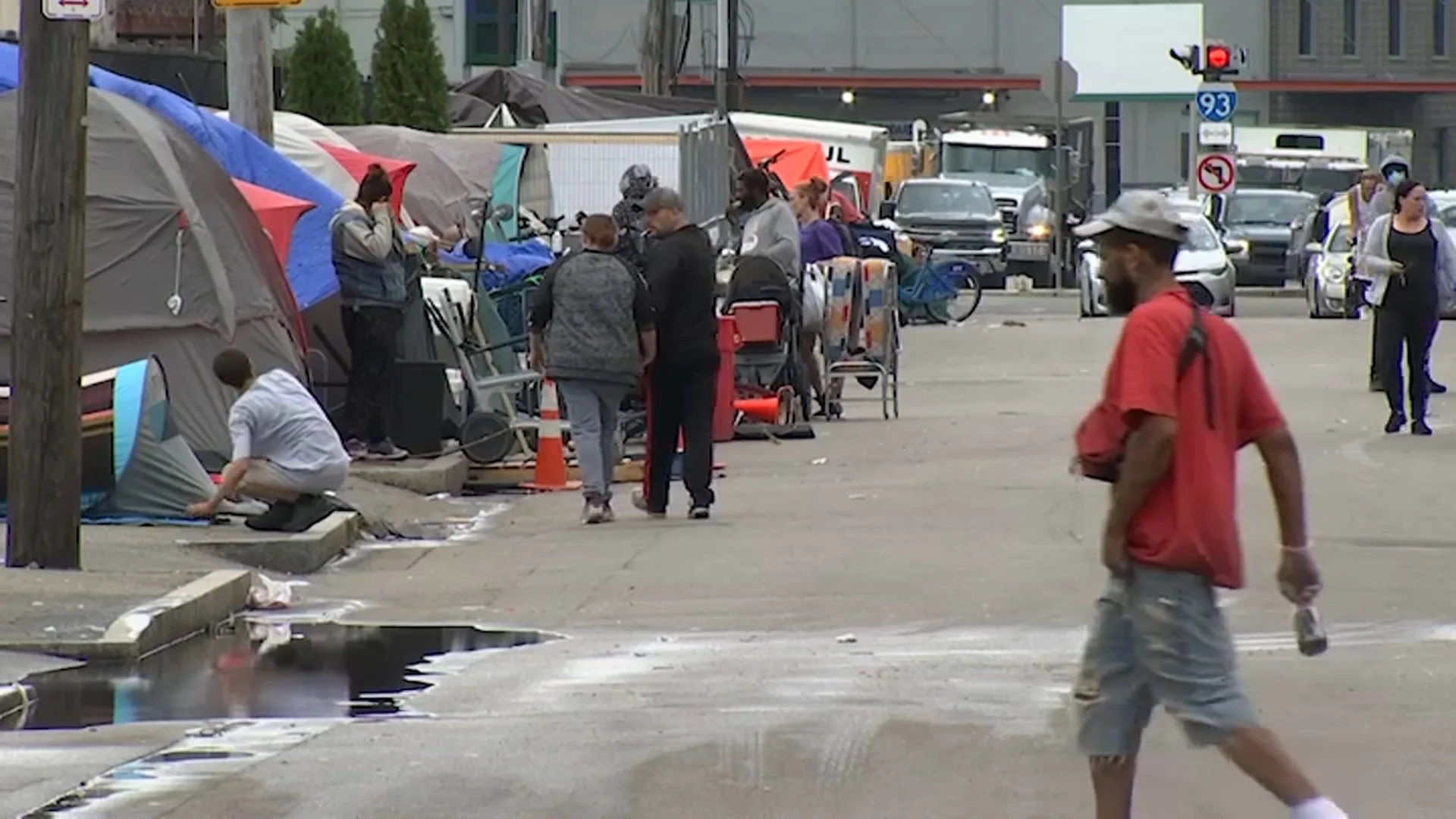|
The following document will be the subject matter of the second half of the Agenda:
WORKING GROUP PRINCIPLES AND INITIATIVES TO FOSTER AND MAINTAIN A HEALTHY MASS AND CASS NEIGHBORHOOD ENVIRONMENT
This document is a product of extensive discussions within and among the abutting neighborhoods of Roxbury, Newmarket, South End, South Boston, and Dorchester as well as our partners and institutional providers.
1. A Moratorium on New Addiction, Recovery, and Homelessness Services Located at Mass and Cass
In order to stem the growth of new services and programs located within the Mass and Cass geography, a cap on either new public or private social services within one mile of Mass & Cass is the only policy (or use permit) vehicle that will allow us to be able to begin to decentralize, the acknowledged key objective that will begin to address the concentrations that have created the public health and public safety crisis that today characterizes Mass and Cass.
2. Use a “Refugee Crisis” model to create initiatives, provide resources, and design policies that will treat the Mass and Cass geography for what it is: a complex refugee environment for those seeking to buy, sell, use and traffic in drugs and human beings.
With over 70% of Mass and Cass populations from outside of Boston, this location has become the default go-to geography for both drug/human traffic, use, and services. Approaching this established and connected location primarily from a public health outreach and harm reduction point of view is insufficient. Both of these strategies are essential tools, but they are not a prescription for a successful long-term strategy. We need the expertise, strategies, and tactics of refugee crisis organizations, NGOs, charitable non-profits, public and private agencies like FEMA and others, to devise a set of procedures to address housing (greatly expanding the stock of transitional supportive housing), service referrals (treatment options from detox to sober house residential living in multiple locations across the state and region, none at Mass and Cass, the epicenter of the crisis), and a robust program of repatriation of those in need to families and communities across the nation.
3. Transition the city’s AHOPE Needle Exchange facility from a “retail client-service” model in one location at Albany Street to a wholesale supplier of clean needle supplies/packets to every Community Health Center across the city and eventually to cooperating pharmacies through a free voucher program.
The creation of the AHOPE needle exchange facility on Albany Street as an early “sole-source” location helped to create what we see today as an over-concentration of services at Mass and Cass. To meet the growing need for the availability of clean needles (and support HIV transmission prevention), AHOPE on Albany Street should no longer serve clients directly, instead providing supplies, materials, and education to our existing Community Health Center network. In addition, the city should work with cooperating pharmacies, already existing supplies or clean needles, to accept vouchers for clean needle supplies that can be distributed through social service and provider organizations. This will make clean needles far more accessible across the city, fulfilling a key public health goal, while decentralizing distribution away from Mass and Cass.
4. Begin negotiations with private methadone clinic providers to create opportunities for reduced brick and mortar clinic locations, using home-delivery as the preferred vehicle for ensuring patients receive their medication in a timely manner.
Methadone is a crucial tool in SUD treatment. However, outdated federal law still requires that private clinics offering this important treatment deliver it through an independent brick and mortar building. The Covid era emergency authority allowing for methadone home delivery (which has been extended) offers an opportunity to bring together existing private methadone treatment clinic providers to explore opportunities for reductions in brick and mortar locations and provide a cooperative framework where geographic coverage is provided without concentrating multiple providers in one location.
At Mass and Cass 1300 people come to the two methadone clinics every day for their methadone dose. According to clinic staff, 85 percent of them either go back home or on to work, while 15 percent of the 1300, or about 200 people, choose to stay in and around Mass and Cass, some percentage of which choose to buy street pharmaceuticals to augment their methadone dose.
5. The City and BMC must commit to a firm date (within the one-year lease) for transferring BMC’s housing and treatment services at the Roundhouse to alternative locations away from Mass and Cass
The Roundhouse facility was leased jointly by the city and BMC as an emergency winter measure/facility to include transitional housing and two clinical programs. While every encounter that may lead to sustained treatment is a positive, the case management numbers reported suggest a not insubstantial number are still not engaged in SUD treatment. This number of active users walk out the door of the Roundhouse into the clutches of drug dealers. Those who have chosen to enter treatment are faced with the same threat. With the winter emergency no longer pressing, it is time to move these programs from the epicenter of the open-air drug market and the most dangerous place in the city for someone in recovery, to alternate locations either within the BMC institutional footprint for clinical services, and alternative transitional supportive housing away from Mass and Cass.
6. Permanently Close the Engagement Center at Atkinson Street and Decentralize services by creating new Engagement/Service Centers (or mobile facilities) to serve select locations throughout the City
When the city first proposed an Engagement Center behind the Southampton Shelter, it was on a trial basis. It was designed to be a multi-service center and safe space to help move those in need into treatment or housing. Over time, the Engagement Center has evolved into something much more and something much less desirable. While medical care, through Boston Health Care for the Homeless, is still available and important, drug dealing, drug use, and violence have become commonplace. The Engagement Center itself has become a victim of the concentration of services in the Mass and Cass area.
Only by creating multiple engagement centers in multiple locations throughout the city will the city be able to achieve the kind of scale first envisioned that will permit realistic management of a safe and supportive service delivery vehicle.
We explicitly encourage the exploration of mobile vehicles instead of brick and mortar facilities which also allows greater flexibility in addressing need and managing problem locations.
7. End the Open-Air Drug Market at Mass and Cass
In press conference on January 10, Mayor Wu promised as her short-term strategy to house those in tents, continue public health outreach, repair and clean the streets, and that “the Boston Police Department will ensure a safe environment for residents, businesses, and individuals accessing care.” While we all applaud the successful removal of the tents and other structures, the open-air drug market persists, which continues to endanger residents and businesses and undermines the will of those trying to recover.
Shutting down open-air drug market is essential to any transformational plan for Mass and Cass. No one comes to Mass and Cass for the view. It is the lure of readily available drugs that continues to draw populations to this single location. As one person from Florida, arrested for stealing packages from a South End front stoop said when asked why they were in Boston: “It’s Methadone Mile, Mass and Cass, it’s really famous. Everyone wants to come here.”
8. Budget for and assign a permanent Bicycle Patrol Unit Dedicated to Mass and Cass
There is little doubt that the most effective patrol resource for Mass and Cass are police officers on bicycles. They have the flexibility, the pedestrian level approach, and the visibility to be far more effective than cruisers assigned to a fixed post. Together with the Street Outreach team and supported by officers from the 3 abutting districts, this should be our first line police response. Unless it is a dedicated unit, present every day, it’s effectiveness will be reduced significantly.
9. Create a flexible treatment protocol/interchange among treatment providers so that court imposed “Stay Away” orders for those arrested at Mass and Cass cannot plead that their “treatment is at Mass and Cass,” and thus stay away orders prevent them from getting treatment.
Every Mass and Cass arrest, insofar as possible, should include a request from the Court for a “Stay Away” order until the case is adjudicated. However, because we have concentrated or saturated services at Mass and Cass, defendants at arraignment tell the court that they are getting treatment for their SUD at a Mass and Cass location. We must find alternate locations for continuing treatment for these defendants and not simply allow them to return to Mass and Cass to once again deal or use creating a revolving door.
Together with the District Attorney, the city and Mass and Cass treatment providers should establish cooperative agreements with other providers located away from Mass and Cass to prevent any defendant from thwarting the public safety benefits and effectiveness of a stay away order.
10. Bring neighborhood and business representatives back to the table with city agencies and decision-makers and allow participation before decisions are finalized
The Working Group on Addiction, Recovery, and Homelessness is a grassroots organization designed to create an open forum for discussion of topics of importance in the named areas. Internal discussions and decisions by the city also occur fairly routinely, but without neighborhood input (except for what is learned in the Working Group). Given the 10 points laid out above, there is ample material for discussion in smaller working groups including city, agency, and our elected officials. We need a better day-to-day communications and dialogue protocol if we are going to make any progress on medium and long term solutions.
|





